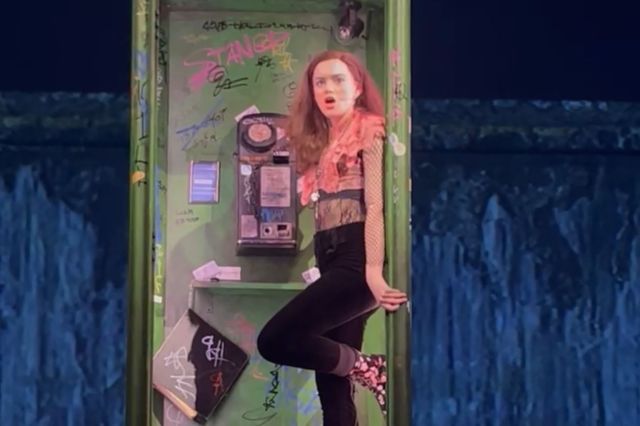Review: Lazarus (King's Cross Theatre)
Michael C Hall and Amy Lennox star in the London transfer of David Bowie and Enda Walsh’s new musical ”Lazarus”
Cards on table. I loved David Bowie; he is one of the most important cultural figures in my life. I am pretty fond too of the playwright Enda Walsh, the director Ivo van Hove and the actor Michael C Hall, best known for TV’s Dexter. So with every bone in my body I was longing to adore Lazarus, the musical based on Bowie’s songs, and devised by him with hefty contributions from them.
And I did. At moments. But not all the time. This is a show full of wild energy, magical effects and overwhelming music. Its themes are pertinent and potentially deeply moving. But what it lacks is any real narrative arc; there’s a concept where its heart ought to be, an emptiness that all its outstanding qualities cannot hide.
It was, of course, the last project of Bowie’s life, which lends it poignancy. He attended the opening night in New York barely four weeks before his death in January this year. And it’s a sequel to his most famous movie role, in Nicolas Roeg’s The Man Who Fell to Earth, where he played Thomas Newton, an alien stranded on our planet, condemned by men never to build the rocket that will take him back to his own.
Picking up the story of Newton’s days watching television and drinking gin, as he faces the terrible loneliness of immortality, Lazarus weaves Bowie’s back catalogue with tracks from his final albums, and three specially written songs, to create a soundscape that is at once familiar and entirely different. It is Bowie as heard through the prism of musical theatre in new voices: "Changes" becomes a plea for a new way of living; "Life on Mars" a pensive declaration; "This is Not America" an enigmatic song of wonder.
Essentially, the musical takes the form of a journey inside Newton’s fractured mind, confusing and confused, but with its own tortured logic. Alone in his barren beige room, the billionaire misfit is haunted by images that may or may not be real. A girl (sweet-voiced Sophia Anne Caruso) steps out from his TV screen to tell him she is here to look after him "in a caring way"; the home help Elly (Amy Lennox) dyes her hair blue and appears to morph into a version of his lost love Mary Lou; a serial killer called Valentine (chillingly embodied by Michael Esper) rampages around and sings "Valentine’s Day" with ferocious menace.
It’s all wonderful to look at, with an excellent live band silhouetted in two great windows at the back of Jan Versweyveld‘s box-like set. As the action unfolds, the space is constantly and thrillingly transformed by his lighting and Tal Yarden’s video design – into the glistening lights of Second Avenue, for example, or a swirling disco, or a blood seeped landscape of horror. When Newton puts the haunting "Where are We Now?" on the record player to console himself in the chaos that surrounds him, images of the streets of Berlin slide across the walls, visible emblems of the seepage between the real and the imagined filling his mind.
But while it is mesmeric, it is also bewildering. The clue as to what is going on may lie in a quote from Hamlet – "in this sleep of death what dreams may come" – and thoughts of death and eternity, dream and waking stalk the action. Walsh’s preoccupations with people’s need to live fantasy lives are a dominant theme. But as Lazarus progresses, it is Bowie’s belief in the power of the imagination and the mind to create and encompass new worlds that comes to the fore.
Hall holds it all together with a kind of anguished abandon, singing the songs with a pure passion and power that invests them with a new life, dancing around the stage arms flung wide, lying in the taped outline of a rocket that points towards the stars, attempting to find peace. The images haunt the imagination but the show never finds lift off. It’s so nearly something. But not quite.
Lazarus runs at the King's Cross Theatre until 22 January.












